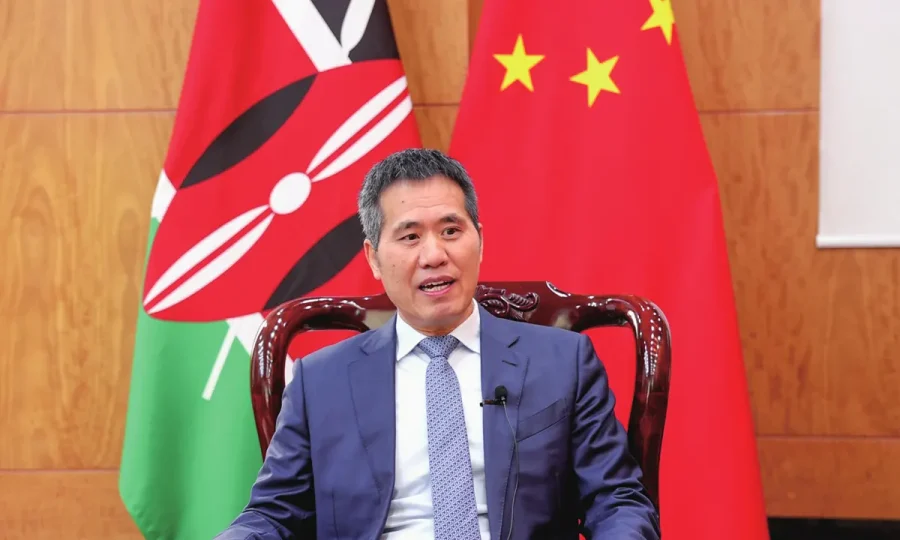Over the last decade, the Belt and Road Initiative (BRI) has yield fruitful achievements and greatly enriched China-Africa relations. As this year marks the 10th anniversary of the proposal of BRI, Global Times reporters Liu Xin and Xing Xiaojing (GT) interviewed Chinese Ambassador to Kenya Zhou Pingjian (Zhou) and Chinese Ambassador to Madagascar GuoXiaomei (Guo), to learn about their views on the BRI’s achievements in the two African countries and their expectations for future cooperation.
GT: Over the last decade, China and Kenya have achieved fruitful results in their cooperation under the Belt and Road initiative (BRI). What do you see as the biggest highlight?
Zhou: The Mombasa-Nairobi Standard Gauge Railway (SGR) is a landmark project by China and Kenya under the BRI, and it is also an exemplar of many fruitful results. In Kenya, the railway is affectionately called the SGR, and is well-known to almost every single Kenyan. As Kenyan President William Ruto said, the railway has completely changed the national landscape of Kenya.
The BRI has transformed Kenya’s dreams into a reality. The narrow-gauge railway in Kenya was built in 1895 and has long been in disrepair. The country has always wanted to build a standard-gauge railway, which is also a key project in its Vision 2030 plan formulated in 2007.
Since the inauguration of the SGR, it has transported about 11 million passengers and about 28 million tons of cargo. It is worth mentioning that the official name of the railway in Kenya is “Madaraka Express” – “madaraka” means independence in the local Swahili language. Therefore, the most important significance of the railway is to enhance the confidence of the Kenyan people in their own development and make them proud.
GT: How do cooperation projects under the BRI, represented by the SGR, promote the development of other sectors by su pporting infrastructure construction in Africa?
Zhou: Infrastructure construction is one of the key focuses of comprehensive cooperation under the BRI, and has unique significance for Kenya.
Kenya itself does not have abundant mineral resources, but its geographical location and regional centrality are very important. Without necessary infrastructure, it cannot consolidate this advantage. That is why Kenya attaches great importance to cooperation with China in building railways, roads, airports, and other forms of infrastructure.
In the construction of these projects, China and Kenya adhere to the principle of extensive consultation, joint contribution, and shared benefits, and implement the concepts proposed by the BRI. Each project effectively addresses Kenya’s development concerns and brings significant benefits, such as creating job opportunities, consolidating regional centrality, and enhancing the confidence of the Kenyan people. No one agrees with the smear of the so-called debt trap.
GT: Based on your understanding, how do people from all walks of life in Kenya respond to the BRI? What role does the initiative play in communicating with the local people?
Zhou: The BRI has an excellent reputation in Kenya, and local friends highly praise the practical changes brought about by China-Kenya cooperation under the initiative.
In 2013, China and Kenya established a comprehensive cooperative partnership of equality, mutual trust, mutual benefit, and win-win cooperation. In 2017, China-Kenya relations were upgraded to a comprehensive strategic cooperative partnership. In the last 10 years, the exchanges between China and Kenya at the head-of-state level have provided strong strategic guidance for the joint construction of the BRI.
In addition to the connectivity of facilities such as the SGR, “soft connectivity” in terms of standard rules and regulations has also been well-coordinated, ensuring smooth trade. A decade ago, the bilateral trade volume between China and Kenya was about $2.8 billion, and in 2022 it reached about $8.5 billion, growing rapidly. The cooperation between the two countries in financial connectivity over the last 10 years has also made great progress.
In the process of jointly building the BRI between China and Kenya, due to the high visibility of projects such as the SGR, the Lamu port, and the Thwake Dam, some people may think that the joint construction mainly focuses on infrastructure.
In fact, the achievements in people-to-people connectivity and cultural exchanges between the two countries are also very prominent. Kenya currently has four Confucius Institutes, the most in any African country. There are also scientific research institutions such as the Sino-Africa Joint Research Center and the Kenya-China Joint Laboratory for Crop Molecular Biology at Egerton University. The embassy staffers always feel enthusiasm when communicating with local people.
GT: We have noticed that many elites in Kenya have a Western education background, but in recent years, more and more young people have tended to opt to study in China. How do you view this change?
Zhou: In Kenya, we hardly hear any negative comments about China. The local people have confidence in China’s development prospects, and naturally want their own future development to be related to China.
Officials from the Kenyan Ministry of Education have expressed that many Kenyan students want to study in China, which also reflects the increasing importance of cooperation with China in Kenya’s consideration of future development.—GT










